NYC Buyer Representation Agreement Rules 2025: What Agents Must Know About Fees, Forms, and Compliance
Last updated: August 15, 2025
This guide is general information for NYC real estate professionals. It is not legal advice. Check REBNY/MLS rules and your brokerage counsel.
NYC Buyer Representation Agreement Rules in 2025 have changed the way real estate agents work with buyers — and compliance is now more critical than ever.
The August 2024 NAR practice changes transformed how NYC agents work with buyers. Some brokerages report initial confusion around compliance, but agents who mastered the requirements early found that transparent fee discussions actually improved client relationships.
If you’re a real estate professional in New York City, these agreements aren’t optional anymore. They’re your new reality, and how you handle them determines whether you thrive or struggle in this changed market.
This guide covers everything you need to know: when agreements are required, what fee structures work best, how to write bulletproof contracts, and a practical compliance checklist you can use today. You’ll also get our NYC Fee Calculator framework to help clients understand their costs upfront.
Understanding the New NYC Requirements
What Changed in January 2025
The National Association of Realtors settlement triggered mandatory buyer representation agreements across the country. While the Real Estate Board of New York wasn’t part of the original settlement, they adopted similar rules to maintain industry standards.
Key requirements now in effect:
- Written agreements required before any property showing
- Virtual tours count as showings requiring agreements
- Commission structures must be clearly disclosed
- Agents face fines up to $2,500 for violations
- All compensation must be negotiable
Open house exception: Buyers can attend open houses without signed agreements, but any follow-up showing requires documentation.
When Written Agreements Are Required
You must have a signed buyer representation agreement before:
- In-person property tours (private showings)
- Live virtual tours where you’re present
- Pre-recorded virtual tours you send directly to clients
- FaceTime or Zoom property walkthroughs
- Any personalized showing service
You do NOT need agreements for:
- Open house attendance
- Public virtual tours on listing websites
- General market consultations
- Initial buyer interviews
Compliance Documentation
Keep detailed records for each client interaction:
- Date and time of agreement signing
- Property addresses shown
- Tour methods used (in-person, virtual, etc.)
- Commission arrangements
- Any modifications or terminations
Observation: Brokerages using digital signature platforms report 40% fewer compliance issues than those relying on paper contracts.
Fee Structures That Work in 2025
Traditional Percentage Model
Most NYC agreements still use percentage-based compensation ranging from 2.5% to 3% of the purchase price. On a $750,000 condo, this equals $18,750 to $22,500.
Seller concession approach: Many transactions still result in sellers paying buyer-agent fees through negotiated concessions, maintaining familiar payment patterns.
Flat Fee Structure
Some brokerages offer flat fees ranging from $10,000 to $25,000 depending on price range and service level. This model works well for:
- Higher-priced properties where percentage fees seem excessive
- Buyers who want predictable costs
- Investment property transactions
Retainer Plus Success Fee
A hybrid model gaining popularity in Manhattan:
- Initial retainer: $2,500-$5,000 upfront
- Success fee: 1.5-2% at closing
- Retainer credit: Applied toward final commission
This structure demonstrates agent commitment while reducing total fees for successful transactions.
Hourly Consultation Model
Some agents offer hourly rates ($150-$300/hour) for:
- Limited service agreements
- Buyer education sessions
- Contract review services
- Market analysis consultations
Fee Negotiation Strategies
For luxury properties ($1M+): Consider stepped commission rates (3% on first $500K, 2.5% above)
For first-time buyers: Offer service packages with fixed fees for specific deliverables
For investors: Create flat-fee structures based on property type and complexity
Essential Agreement Components
Duration and Exclusivity Terms
Maximum term: Three months under NAR settlement rules
Exclusivity options:
- Exclusive buyer agency (most common)
- Non-exclusive arrangements (allows multiple agents)
- Limited exclusivity (specific neighborhoods or price ranges)
Best practice: Start with 60-day terms to build trust before longer commitments.
Geographic and Price Scope
Define exactly what your agreement covers:
- Specific boroughs or neighborhoods
- Property types (condos, co-ops, single-family homes)
- Price ranges ($400K-$800K, for example)
- Commercial vs. residential boundaries
Termination Procedures
Include clear language for ending agreements:
- Notice period: 5-10 business days written notice
- Grounds for termination: Performance issues, changed circumstances
- Financial obligations: How fees are handled if deals are in progress
- Property protection: Rights to properties shown during agreement term
Compensation Transparency
Your agreement must specify:
- Commission rate or flat fee amount
- Payment source (seller concession vs. buyer direct payment)
- Additional service fees (if any)
- Bonus or incentive structures
Sample language: “Buyer Agent compensation of 2.75% of purchase price, payable at closing. If Seller does not offer sufficient concession, Buyer is responsible for the difference.”
The 7-Point NYC Buyer Agreement Checklist
Use this framework to ensure your agreements protect both you and your clients:
1. Legal Compliance Verification
- Agreement duration 90 days or less
- Clear compensation disclosure
- NAR settlement compliance language
- REBNY form requirements met
2. Service Level Definition
- Specific services listed (tours, analysis, negotiation)
- Response time commitments
- Market research deliverables
- Professional referral obligations
3. Financial Protection
- Maximum buyer financial exposure stated
- Seller concession procedures explained
- Payment timing clarified
- Additional fee limitations
4. Scope Boundaries
- Geographic area defined
- Property type restrictions noted
- Price range parameters set
- Timeline expectations established
5. Dual Agency Disclosure
- Potential conflicts explained
- Consent procedures outlined
- Reduced fiduciary duties disclosed
- Alternative representation options provided
6. Technology and Communication
- Virtual showing procedures
- Digital signature authorization
- Communication preferences documented
- Emergency contact protocols
7. Exit Strategy Protection
- Reasonable termination procedures
- Notice requirements specified
- Outstanding obligation handling
- Property protection periods defined
NYC Fee Calculator Framework
Create transparency with this simple calculator approach:
Basic Calculation Method
Property Price × Commission Rate = Total Fee
Example: $650,000 × 2.75% = $17,875
Seller Concession Scenarios
Scenario A – Full Seller Concession:
- Property price: $650,000
- Seller offers: 2.75% buyer agent fee
- Buyer pays: $0 additional
Scenario B – Partial Seller Concession:
- Property price: $650,000
- Seller offers: 2.0% buyer agent fee ($13,000)
- Buyer owes: $4,875 additional at closing
Scenario C – No Seller Concession:
- Property price: $650,000
- Seller offers: 0% buyer agent fee
- Buyer pays: $17,875 full fee at closing
Cash Requirement Impact
Remember: Buyer agent fees cannot be financed through conventional mortgages. Calculate total cash needs:
- Down payment: $65,000 (10%)
- Agent fee (if no concession): $17,875
- Legal fees: $3,500
- Move-in costs: $5,000
- Total cash needed: $91,375
Common Pitfalls and How to Avoid Them
Documentation Failures
Problem: Showing properties before signed agreements
Solution: Use digital signature tools for immediate contract execution
Problem: Unclear virtual tour policies Solution: Define all tour types in your brokerage policies
Financial Misunderstandings
Problem: Buyers surprised by fee obligations Solution: Use fee calculator scenarios during initial consultations
Problem: Double-payment confusion Solution: Include seller concession credit language in all agreements
Contract Ambiguities
Problem: Vague termination procedures Solution: Use specific timelines and notice requirements
Problem: Unclear service expectations Solution: Create detailed service level appendices
Downloadable Resource: NYC Buyer Agreement Audit Template
We’ve created a comprehensive audit template that includes:
Agreement Review Checklist (25 points)
- Legal compliance verification
- Financial protection assessment
- Service level evaluation
- Risk mitigation review
Client Communication Scripts
- Fee explanation dialogues
- Termination conversation guides
- Objection handling responses
- Seller concession discussions
Compliance Tracking Sheets
- Client interaction logs
- Agreement modification records
- Termination documentation
- Audit trail maintenance
Sample Contract Clauses
- Termination language options
- Compensation structures
- Service level definitions
- Geographic scope limitations
Access the complete template package at [your-website.com/nyc-buyer-agreement-audit]
Frequently Asked Questions
Do NYC buyers need a written agreement before touring in 2025?
Yes, you must have a signed buyer representation agreement before any private property showing, including virtual tours where you’re present. However, buyers can attend open houses without agreements.
What counts as a “tour” for the written agreement rule, including live virtual?
Any personalized showing service requires an agreement: private in-person tours, live virtual walkthroughs via Zoom or FaceTime, and pre-recorded tours you send directly to clients. Public virtual tours on listing websites don’t require agreements.
Who pays the buyer-agent fee in NYC now, and what models are common?
Payment varies by transaction. Sellers may offer concessions to cover buyer-agent fees (maintaining traditional patterns), or buyers pay directly. Common models include 2.5-3% percentage fees, $10,000-$25,000 flat fees, or retainer plus success fee structures.
Can a buyer negotiate a flat fee or retainer instead of a percentage?
Absolutely. All compensation is negotiable. Many agents offer flat fees ($15,000-$25,000), hourly rates ($200-$300/hour), or retainer plus reduced percentage arrangements. Choose structures that match your service level and market position.
What should a buyer-rep agreement include in terms of duration, exclusivity, and termination?
Agreements cannot exceed three months under NAR rules. Include specific termination procedures with 5-10 day notice periods, define exclusive vs. non-exclusive arrangements, and clarify financial obligations for deals in progress.
Can an agreement limit scope to certain neighborhoods or price ranges?
Yes, you can define specific geographic areas, property types, and price ranges. This helps manage client expectations and your time investment. Example: “Manhattan condos between $500K-$1.2M” or “Brooklyn brownstones under $2M.”
How do seller concessions interact with buyer-agent compensation at closing?
When sellers offer concessions covering buyer-agent fees, buyers pay nothing additional. If seller concessions are less than agreed fees, buyers pay the difference. Your agreement should specify how these credits are applied at closing.
What happens if a buyer signs with multiple agents under non-exclusive agreements?
Non-exclusive agreements allow buyers to work with multiple agents simultaneously. However, this typically results in less dedicated service. Include “protection periods” for properties you show to ensure compensation if buyers purchase through other agents.
Can buyers cancel the agreement, and how should termination language be written?
Yes, with proper notice. Include specific termination procedures: required notice period (5-10 business days), acceptable reasons for termination, and protection for ongoing transactions. Avoid excessive penalties that trap clients.
Are there open house exceptions, and how are they handled?
Buyers can attend open houses without signed agreements. However, any follow-up private showing requires documentation. Some agents ask open house visitors to sign limited agreements for future showings.
How do teams handle lead attribution and compensation inside buyer agreements?
Team agreements should specify which agent has primary client responsibility and how internal compensation splits work. Include language about team member substitution and client notification requirements if primary agents change.
What records should brokers keep to prove compliance during audits?
Maintain digital records of: signed agreements with timestamps, property showing logs, client communication records, agreement modifications, and termination documentation. Store records for at least three years and ensure easy retrieval during regulatory reviews.
Taking Action on NYC’s New Reality
The buyer representation agreement mandate isn’t going away. Agents and brokers who treat these requirements as opportunities for better client relationships and clearer business practices are seeing improved results.
Your next steps are straightforward: audit your current agreement templates, train your team on compliant procedures, and create transparent fee discussions that build trust instead of confusion.
The real estate professionals winning in this new environment aren’t fighting the changes—they’re using them to demonstrate professionalism and create competitive advantages.
Ready to master NYC’s buyer representation requirements? Download our complete Buyer Agreement Audit Template and join 500+ NYC agents who’ve streamlined their compliance while improving client satisfaction. [Request the template here] or connect with me on LinkedIn to discuss how these changes are affecting your business.
Sources
- Real Estate Board of New York. “2025 Buyer Representation Guidelines.” January 2025. rebny.com
- National Association of Realtors. “Settlement Agreement Implementation Guide.” December 2024. nar.realtor
- New York State Department of State. “Real Estate License Law Updates.” January 2025. dos.ny.gov
- Fannie Mae. “Buyer-Paid Compensation Guidelines.” February 2025. fanniemae.com
- NYC Department of Consumer Affairs. “Real Estate Disclosure Requirements.” March 2025. nyc.gov
- Real Estate Board of New York. “Transaction Volume Report Q1 2025.” April 2025. rebny.com

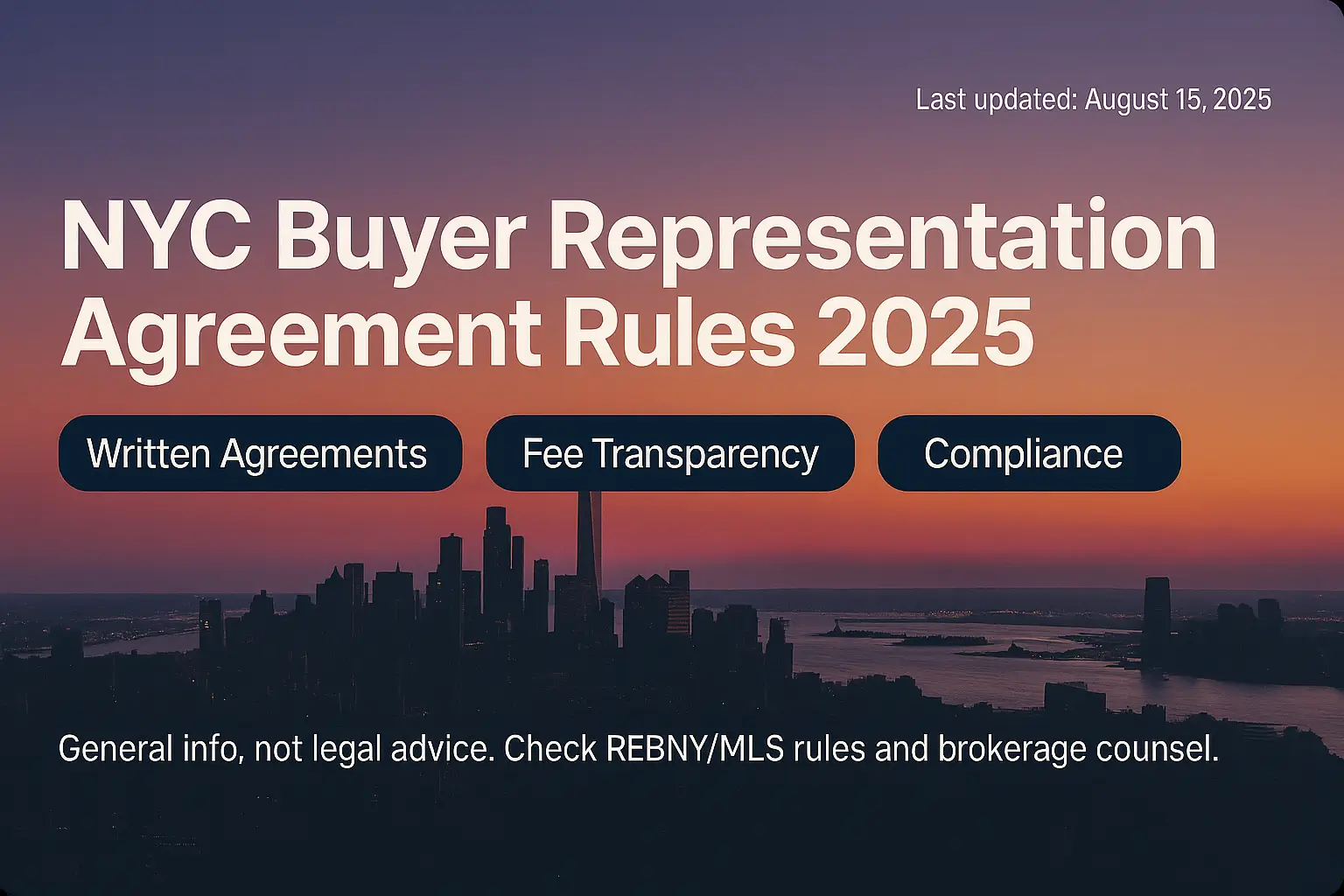
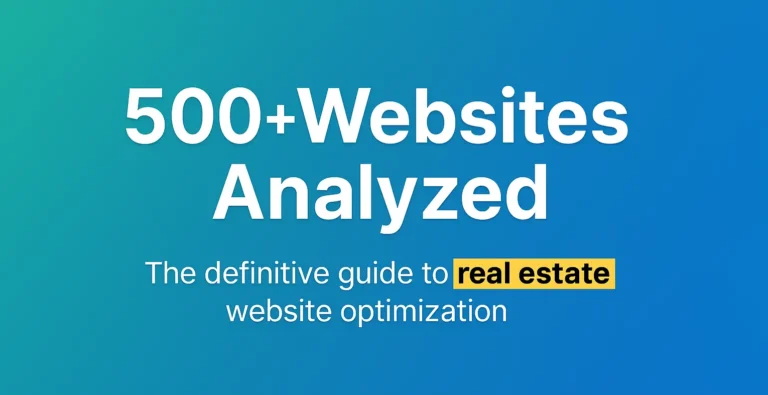
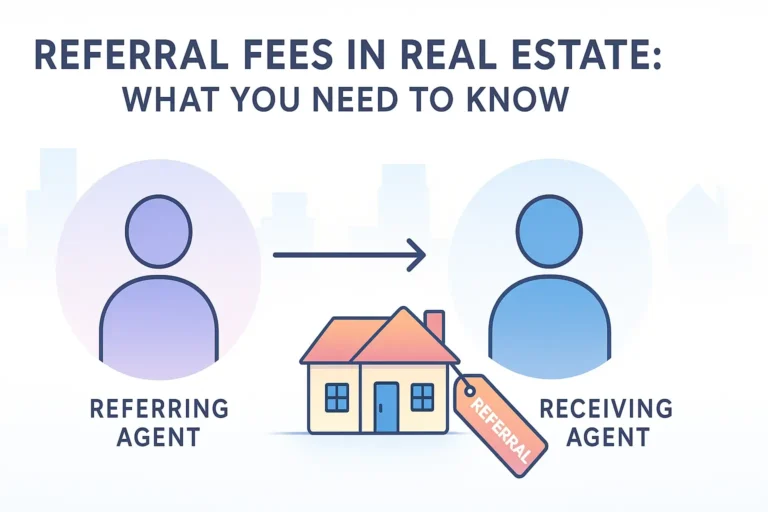

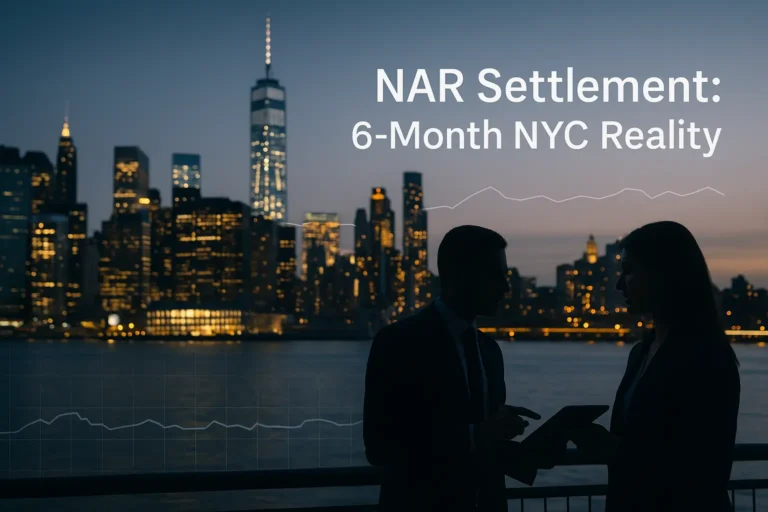

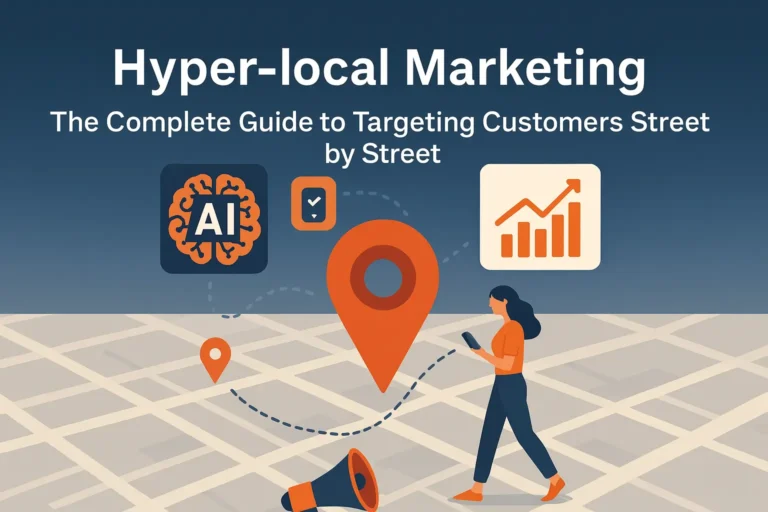
3 Comments